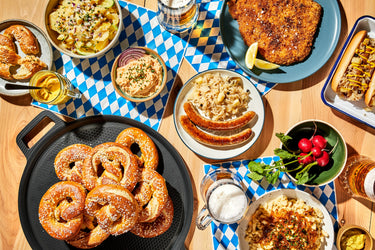What is Oktoberfest and Why Is it Celebrated?

Beer drinkers and pretzel lovers know that the year's best holiday is in the fall.
Nope, it's not Halloween or Thanksgiving: It’s Oktoberfest. More than 200 years old, this beloved Bavarian tradition is still celebrated in Oktoberfest’s home city of Munich, as well as around the world in cities such as Chicago, London and Kitchener-Waterloo, Ontario. Munich is famous for its beer hall culture, which promotes a democratic sense of what Bavarians call “gemütlichkeit”—an untranslatable word that roughly means "good feeling, belonging and coziness"—that reaches its pinnacle during the annual folk festival.
If you’re wondering when Oktoberfest happens, the name actually isn’t the clue. Oktoberfest begins in September, comprising the two week period leading up to the first Sunday in October. That means the best time to start planning your own Oktoberfest celebration is mid-September, latest. (And boy, have we got the recipes for you!)
The first Oktoberfest took place in 1810—a five-day festival celebrating the marriage of the future King Louis I (then Crown Prince Ludwig of Bavaria) and Princess Therese von Sachsen-Hildburghausen. A horse race concluded the festivities, taking place on a meadow that came to be known as Theresienwiese, German for “Therese’s green.”

Now, the festival is known colloquially to Bavarians as "Wiesn," a shortening of the annual Oktoberfest location. But the version of Oktoberfest that is famous today did not evolve until subsequent years, when locals wanted to return to the joyous festivities of the years before.
By 1819, Oktoberfest was already a lucrative source of tourism for Munich. Over the years, new Oktoberfest traditions emerged, including the famous roast chicken—pegged to the 1881 Oktoberfest—and the wooden “beer castles” erected to house festival-goers during their revelry. Around six million visitors trek to Munich each year to enjoy the beer, food and carnival-like atmosphere on the Munich grounds. The festival was shuttered for two years during the height of the Coronavirus pandemic, perhaps leading to the record-breaking attendance in 2023 of 7.2 million attendees. (In total, around 6.5 million liters of beer were drunk!)
All this Oktoberfestbier hails from the Association of Munich Breweries, including world-renowned brands such as Löwenbräu, Hofbräu, Paulaner, and Augustiner. If you're planning to host your own Oktoberfest celebration at home —we’ve got some sehr lecker, aka "very delicious" Oktoberfest-inspired German recipes for you —we suggest seeking out these brands, many of which are available stateside.
It wouldn’t be Oktoberfest without the classic dishes that festival-goers know and love. Expect to see dishes like roast pork with Kartoffelknödel (potato dumplings), roast chicken, bratwurst with sauerkraut, creamy spätzle noodles, crispy pork schnitzel with potato salad and, of course, pretzels!

Though you might be accustomed to pretzels served with mustard, Bavarians know best: Pretzels (Laugenbrezel, in German) are most delicious with a cheese dip called Obatzda. Available widely in German supermarkets, the best Obatzda is homemade. To make it, combine Camembert cheese, cream cheese, butter, caraway seeds, paprika (both sweet and spicy), and a touch of beef (naturally). Do as the Bavarians do and spread both chunks of pretzel and spicy radishes with the dip. Fancying something sweet? Oktoberfest offers desserts such as Kaiserschmarrn, a fluffy pancake that’s torn into pieces, dusted with powdered sugar, and served with stewed plums or cherry compote.
Bavarian brass bands—what Americans call "German oompah music"—offer a traditional soundtrack to the festivities, but it isn’t a true Oktoberfest without joining in on the most popular Oktoberst songs. In addition to classics like "Ein Prosit der Gemütlichkeit" that end with an obligatory beer chug, expect international classics like Gloria Gaynor’s “I Will Survive” and '80s Italian pop hit “Sarà perché ti amo” by Ricchi E Poveri.
Oktoberfest evolves with the times, but you'll definitely see plenty of lederhosen for men and dirndls for women. Though these were once everyday clothes for Bavarian people, they are now mostly trotted out to celebrate this beloved time of year. If you do decide to wear a dirndl, you might want to take into account the placement of the apron bow: Tie it on the left if you are single, on the right if you are taken, and on the back if you are widowed (or working).
Feeling inspired to get your own Oktoberfest on? Rustle up some beers, don your dirndl, and cue the brass band tunes. Prost!





